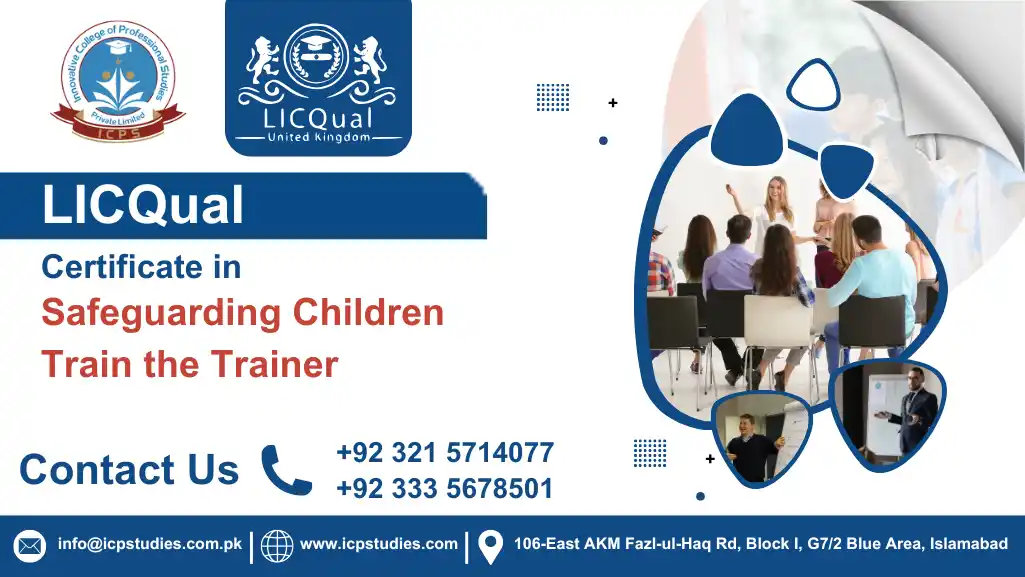The LICQual Certificate in Safeguarding Children Train the Trainer is a professional development programme designed for individuals who wish to become certified trainers in child safeguarding. This course empowers learners with the knowledge, skills, and confidence to train others in identifying, preventing, and responding to safeguarding issues affecting children and young people. Delivered in line with UK safeguarding frameworks, this qualification promotes best practices in child protection and welfare education. This LICQual Certificate in Safeguarding Children Train the Trainer is structured to support professionals who aim to take on training and leadership roles within educational, care, or community settings. It covers essential safeguarding principles, legal responsibilities, signs of abuse, and effective reporting procedures.
Learners will also develop core training skills, including how to deliver engaging sessions, assess learning outcomes, and handle sensitive discussions. The LICQual Certificate in Safeguarding Children Train the Trainer not only builds subject matter expertise but also prepares participants to educate others with professionalism and clarity. Choosing the LICQual Certificate in Safeguarding Children Train the Trainer offers the opportunity to gain a recognised qualification that supports professional credibility and career growth. The course combines theory with practical application, equipping learners to confidently deliver safeguarding training and raise awareness in a variety of settings.
The LICQual Certificate in Safeguarding Children Train the Trainer course is a meaningful step toward becoming an advocate and educator for child safety. Whether enhancing your current role or preparing for new professional opportunities, this qualification enables you to make a lasting difference through effective training and safeguarding leadership. Upon successful completion of the LICQual Certificate in Safeguarding Children Train the Trainer, learners may advance to further qualifications in training and assessment, leadership in safeguarding, or child welfare management. This certificate also strengthens applications for training roles within schools, health services, social care agencies, and NGOs.
All About LICQual Certificate in Safeguarding Children Train the Trainer
Course Overview
The LICQual Certificate in Safeguarding Children Train the Trainer is a comprehensive programme designed to prepare professionals to deliver effective safeguarding training within their organisations or communities. The course focuses on equipping learners with a thorough understanding of child protection principles, legislation, and responsibilities, alongside practical training delivery techniques.
Learners will explore how to recognise signs of abuse, respond appropriately to safeguarding concerns, and create safe learning environments. In addition to subject knowledge, the course also enhances communication, presentation, and adult learning facilitation skills—crucial for anyone aiming to deliver impactful safeguarding sessions.
This LICQual Certificate in Safeguarding Children Train the Trainer is ideal for professionals in education, social care, healthcare, and community services who wish to take on a training role in child safeguarding. Upon completion, learners will be fully equipped to raise awareness, promote best practices, and train others to maintain high standards of child protection.
Study Units
- Introduction to Child Safeguarding
- Legislation and Policy Framework
- Recognizing Signs of Abuse
- Safeguarding Procedures
- Training Design and Delivery
- Facilitation and Communication Skills
To ensure learners are well-prepared to engage with the course content and successfully deliver safeguarding training, the following entry requirements must be met:
Minimum Age
Learners must be at least 18 years of age at the time of enrolment to demonstrate the maturity required for dealing with sensitive safeguarding topics.
Educational Background
A minimum of a high school diploma or equivalent qualification is recommended. While prior knowledge of safeguarding principles is beneficial, it is not essential for enrolment.
Work Experience
Although not mandatory, previous experience in education, childcare, health and social care, or related sectors is advantageous and will support a deeper understanding of course material and real-world application.
Language Proficiency
A good command of the English language is required. Learners must be able to read, write, and communicate effectively in English to fully participate in discussions, comprehend course materials, and deliver professional training sessions.
This course is designed for individuals who are passionate about child protection and wish to take on a training role within their organisation or community. Intended learners include:
- Professionals in education such as teachers, school leaders, and teaching assistants responsible for safeguarding awareness among staff and students
- Social workers, child protection officers, and youth workers seeking to enhance their training capabilities in safeguarding practices
- Healthcare professionals, including nurses and paediatric staff, who provide care and support to children and families
- Individuals working in charities, NGOs, and community outreach programmes that involve vulnerable children or youth services
- HR professionals, training coordinators, and safeguarding leads who are responsible for implementing internal training programmes
- Anyone with an interest in child welfare who aspires to become a certified safeguarding trainer, regardless of their current profession
This course supports learners from diverse backgrounds and equips them with the essential knowledge and practical skills needed to train others confidently and responsibly in safeguarding children.
Learning Outcomes
Introduction to Child Safeguarding
- Understand the fundamental principles and importance of child safeguarding
- Explain the roles and responsibilities of individuals and organisations in protecting children
- Identify key concepts such as duty of care, risk, and child-centred approaches
Legislation and Policy Framework
- Gain knowledge of national and international safeguarding legislation
- Understand the impact of legal and ethical standards on safeguarding practice
- Interpret organisational policies and procedures in line with legal requirements
Recognizing Signs of Abuse
- Identify various forms of child abuse, including physical, emotional, sexual, and neglect
- Recognise behavioural and physical indicators of potential abuse
- Understand risk factors and protective factors in different environments
Safeguarding Procedure
- Learn the correct steps to take when a safeguarding concern arises
- Understand the process of reporting, recording, and referring cases
- Apply safe practices when managing disclosures and maintaining confidentiality
Training Design and Delivery
- Develop structured safeguarding training sessions tailored to different audiences
- Apply instructional design principles to create effective learning materials
- Integrate case studies, scenarios, and interactive methods to enhance learner engagement
Facilitation and Communication Skills
- Build effective communication strategies for delivering sensitive content
- Learn facilitation techniques to manage group dynamics and encourage participation
- Demonstrate professionalism, empathy, and clarity when discussing safeguarding topics
FAQs LICQual Certificate in Safeguarding Children Train the Trainer







